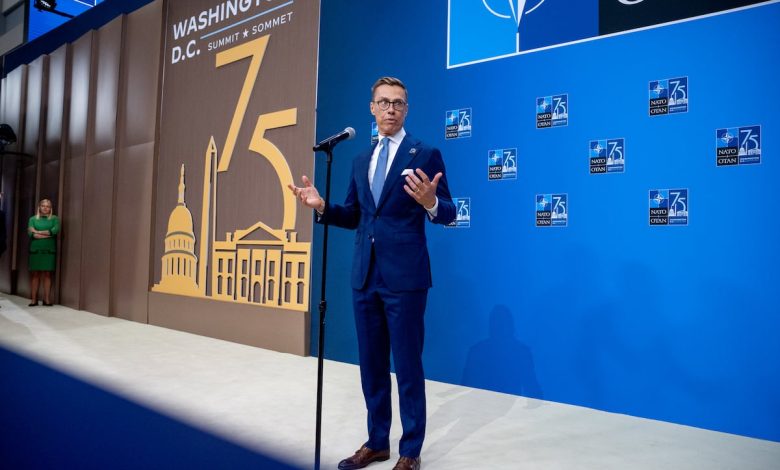Finnish startups are thriving in the wake of NATO expansion

HELSINKI — Startups are driving growth within Finland’s defense sector after the country joined NATO last year, with companies showing upticks in revenue of between 30% and 40%, according to an industry survey by the Helsinki-based investment firm Tesi Oy.
The survey found that the “NATO dividend” is working best for dual-use companies that are gaining traction from membership in the alliance to grow at a faster pace than pure defense groups.
Significantly, the survey revealed that many of the industry’s established companies, including the Finnish state controlled defense group Patria, are scaling up investments in the face of expanding their international reach to take advantage of NATO-sphere partnerships and contract opportunities.
Dual-use companies offering solutions for both civil and military use are not just experiencing rapid growth, but are also attracting indigenous and international investors, said Jakob Sandell, Tesi’s research director.
“Finland’s oldest defense companies date from the 1800s, yet as a whole the industry is still young but developing quite rapidly now. New companies are being established at a higher rate and their growth figures are impressive,” Sandell said.
The Tesi survey identified 368 companies operating in the indigenous defense sector, of which 144 were designated as “fast-growing startups and growth companies.”
Over one-third of Finnish companies offering dual-use products (DUPs) have venture capital and private equity investors as owners, the survey noted. Venture capital investors are currently the single biggest investor group in DUP companies. The growth capital needs in those firms has risen in line with investor interest and a boom in export licenses and sales.
New capital is required to ensure dual-use companies can meet increasing demand for products, orders and the wider opportunities presented by Finland’s membership of NATO, said Keith Bonnici, investment director at Tesi.
“Testimony to the country’s competitiveness in the defense industry generally is that Finnish companies include the world’s largest defense contractors amongst their customers, as well as NATO countries’ defense forces,” Bonnici said.
Some of Finland’s more established defense-only companies, the Tesi survey found, are producing moderate but positive growth albeit susceptible to weak profitability.
“It’s more difficult for companies focused entirely on defense materials and technology … to attract investments. Many investors are bound by financing agreements that may prohibit investing in technologies used for war purposes. This limitation does not apply to companies offering dual-purpose solutions since they operate with a specific commercial purpose,” said Bonnici.
Finland’s membership in NATO has opened the door to a “vast new array” of projects and commercial opportunities for startups like Varjo Oy, a company offering virtual- and mixed-reality solutions for flight training applications
“NATO membership has made a positive impact on Varjo’s operations. It has opened doors that were once largely closed to doing business with NATO countries in Europe, the United States and beyond,” said Varjo’s chief executive Timo Toikkanen.
Varjo opened a new secure manufacturing facility near Helsinki in August to bolster production and delivery of high-resolution, extended-reality (XR) solutions that are used in defense training and simulation, a niche market the company forecasts will be worth $900 million by 2027.
The U.S. Air Force and Navy currently use Varjo XR headsets in their virtual training programs, with additional prototypes slates for the air service for evaluation.
The NATO dividend is also lifting orders for Finland’s mature defense groups like Patria, which continues to deliver Patria 6×6 armored vehicles to the Finnish Defense Forces (FDF) as part of Finland’s commitment to strengthening its land forces in support of deeper collaboration with the alliance.
The FDF’s Logistics Command Unit signed an agreement to purchase 91 6×6 armored personnel carriers (APCs), with equipment, from Patria in 2023.
The 2023 deal included an option to procure an additional 70 six-wheeled vehicles. The FDF, which exercised its option to purchase 41 additional Patria APCs in January 2024, is now utilizing that right to acquire the remaining 29 vehicles. These are slated to be delivered by year-end 2025.
The Patria 6×6 APC procurement is linked to the European Common Armoured Vehicle System (CAVS) joint development program partnered by Finland, Latvia, Sweden, and Germany.
The landscape for growth and contracts among native defense companies has substantially improved due to Finland’s ambitious capital spending commitments to the NATO alliance. Finland’s defense budget will rise by 12% to a record $7.3 billion in 2025. The increase in capital spending is $550 million above Finland’s defense budget in 2024.
The acquisition of fighter jets and armored vehicles from Patria are among the priciest items in the 2025 budget, which also includes spending of $80 million towards Finland’s NATO contribution.
The increased level of funding is earmarked to help establish an alliance command structure in Finland and enable land forces to be stationed as part of the reinforcement of the NATO’s eastern flank along Finland’s 833-mile border with Russia.
Gerard O’Dwyer is the Scandinavian affairs correspondent for Defense News.







